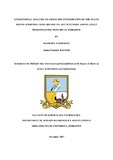Please use this identifier to cite or link to this item:
https://cris.library.msu.ac.zw//handle/11408/3309| Title: | Longitudinal analysis to assess the contribution of the multi-month scripting (mms) regime on art outcomes among adult persons living with HIV in Zimbabwe | Authors: | Sanhokwe, Hamfrey | Keywords: | HIV and AIDS Antiretroviral treatment Multi-month scripting Immunological outcomes |
Issue Date: | 2017 | Publisher: | Midlands State University | Abstract: | Zimbabwe has a generalized HIV epidemic. Since 2015, the national ART program has been rolling out a suite of differentiated models of care in line with the 2013 WHO guidelines. One of the common models adopted by the country is Multi-Month Scripting (MMS) for stable ART patients. Insufficient evidence exists in the country around the contribution of MMS to patient level ART outcomes, almost two years after it was rolled nationally. A retrospective cohort study was conducted at the five ART clinics in Chitungwiza. Secondary sources of data were used in the research. Longitudinal data analysis techniques were applied, including survival analysis. Among the 305 ART patients with HIV/AIDS who initiated ART, there were five AIDS-related deaths; two within the first 6 months, two between the 42-48-month period and one in the 54-60-month period. Overall, the median survival time (53 months) was the same among MMS and non-MMS clients. The retention rates at 12, 24, 36, 48 and 60 months were 98%, 97%, 96% 91% and 87% respectively, and were not statistically different between MMS and non MMS clients. There was a statistically significant change in the CD4 counts (initial vs. follow up) for non-MMS clients. There were significant gains in weight among both MMS and nonMMS clients. The outcomes of interest (weight, survival, retention and changes in CD4 cell count) were primarily associated with sex, age, WHO stage at initiation, receipt of Cotrimoxazole and level of education, among other factors, albeit at varying degrees of significance. Two years into the roll out of MMS, this study suggests that there are no statistically significant differences in observed outcomes between clients on MMS and those not on MMS. More research is necessary to conclusively determine the contribution of each of the models of differentiated care to observed outcomes. However, the contribution of MMS to observed ART outcomes could as well be clinically significant. The factors associated with the clinical outcomes look similar to prior studies, albeit at varying levels of statistical significance. | URI: | http://hdl.handle.net/11408/3309 |
| Appears in Collections: | Master of Science Degree in Biostatistics and Epidemiology |
Files in This Item:
| File | Description | Size | Format | |
|---|---|---|---|---|
| Thesis - December 10 2017- FINAL VERSION FOR PRINTING.pdf | Full Text | 1.88 MB | Adobe PDF |  View/Open |
Page view(s)
272
checked on Feb 14, 2026
Download(s)
116
checked on Feb 14, 2026
Google ScholarTM
Check
Items in MSUIR are protected by copyright, with all rights reserved, unless otherwise indicated.



